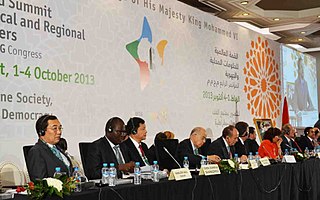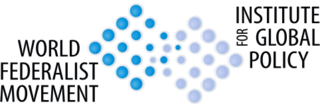The World Student Christian Federation (WSCF) is a federation of autonomous national Student Christian Movements (SCM) forming the youth and student arm of the global ecumenical movement. The Federation includes Orthodox, Protestant and Catholic students.

Pax Christi International is an international Catholic peace movement. The Pax Christi International website declares its mission is "to transform a world shaken by violence, terrorism, deepening inequalities, and global insecurity."

Alceu Amoroso Lima was a writer, journalist, activist from Brazil, and founder of the Brazilian Christian Democracy. He adopted the pseudonym Tristão de Ataíde in 1919. In 1928 he converted to Catholicism and eventually became head of Catholic Action in Brazil. Although he initially had some sympathy for certain aims of Brazilian integralism he became a strong opponent of authoritarianism in general and Fascism in particular. That came in part through the influence of Jacques Maritain. He was a staunch advocate for press freedom during the period of military dictatorship.
IMCS can refer to any of the following:

Diego Borja Cornejo is an Ecuadorian economist and politician born in Quito, Ecuador. Between 2005 and 2006 he served as Minister of Economy and Finance. He was elected member of the National Constitutional Assembly on September 30, 2007. He resigned this position to be appointed Coordination Minister for Economic Policy on December 23, 2008
The Directory of International Associations of the Faithful, published by the Dicastery for the Laity, Family and Life, lists the international associations of the faithful in the Catholic Church that have been granted official recognition. It gives the official name, acronym, date of establishment, history, identity, organization, membership, works, publications, and website of the communities and movements.

The Student Catholic Action is a religious student organization in the Philippines. Its affiliation overseas is the International Young Catholic Students (IYCS), also known as International Young Christian Students in Asia, that follows the methodology of Cardinal Joseph Cardijn, the see-judge-act methodology. Known to be the first student religious organization in the Philippines and presently known all over the Philippines through local dioceses and catholic schools.
The Scout Movement in Spain consists of about 30 independent associations, most of them active on the regional level. Due to the regionalisation of Spain, even the larger nationwide associations are divided into regional sub-associations with individual emblems, uniforms and Scout programs.

The International Federation of Red Cross and Red Crescent Societies (IFRC) is a worldwide humanitarian aid organization that reaches 160 million people each year through its 191 member National Societies. It acts before, during and after disasters and health emergencies to meet the needs and improve the lives of vulnerable people. It does so independently and with impartiality as to nationality, race, gender, religious beliefs, class and political opinions.

The National Catholic Student Coalition is an organization made up of Catholic Campus Ministry groups at colleges or universities throughout the United States.

FECRIS – (in French)European Federation of Centres of Research and Information on Sectarianism, a French non-profit association and anti-cult organization, serves as an umbrella organization for groups which investigate the activities of groups considered cults in Europe.

United Cities and Local Governments (UCLG) is an umbrella international organisation for cities, local and regional governments, and municipal associations throughout the world that is concerned with representing and defending the interests of local governments on the world stage.

Piotr Mateusz Andrzej Cywiński is a Polish historian, medievalist and social activist. He has served as Director of the Auschwitz-Birkenau State Museum since 2006. From 2000 to 2010, he was the Director of the Catholic Intelligentsia Club (KIK) in Warsaw.
The Dicastery for Promoting Christian Unity, previously named the Pontifical Council for Promoting Christian Unity (PCPCU), is a dicastery within the Holy See whose origins are associated with the Second Vatican Council which met intermittently from 1962 to 1965.

The Global Greens (GG) is an international network of political parties and movements which work to implement the Global Greens Charter. It consists of various national green political parties, partner networks, and other organizations associated with green politics.
The 2011 Chilean protests over the education have been primarily led by the CONFECH, the student unions association of Chile's 25 traditional universities, and CONES the student union association of secondary students of Chile. The student union leaders of emblematic universities and schools account for most of the movements leadership at national level.
The Italian Catholic Federation of University Students is a federation of groups representing Roman Catholic university students in Italy.

Women's International Democratic Federation (WIDF) is an international organization with the stated goal of working for women's rights. It was established in 1945 and was most active during the Cold War. It initially focussed on anti-fascism, world peace, child welfare and improving the status of women. During the Cold War era, it was described in recovered FBI files as Communist-leaning and pro-Soviet. International Day for Protection of Children, observed in many countries as Children's Day on June 1 since 1950, was established by the Federation at its November 1949 congress in Moscow. The WIDF published a monthly magazine, Women of the Whole World, in English, French, Spanish, German, and Russian, with occasional issues in Arabic.

The World Federalist Movement/Institute for Global Policy, Ltd. is an organization that advocates for a democratic world government of a world federalist system. They seek to realize these goals by expanding international organizations and moving towards a unified system of governance.
The Catholic Bishops' Conference of Myanmar (CBCM), formerly the Catholic Bishops' Conference of Burma, is the episcopal conference of Myanmar.














